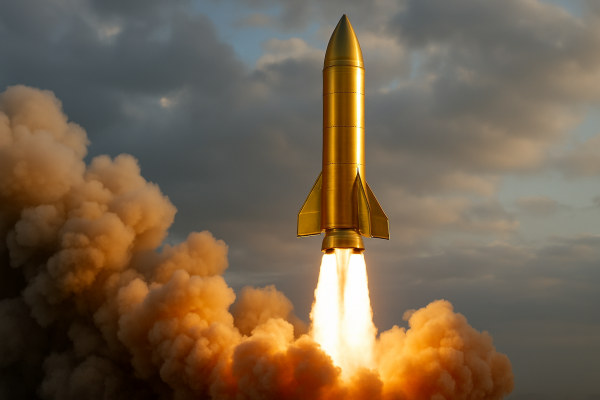August 13th, 2024 | 07:00 CEST
Commerzbank, Desert Gold, Coinbase - Which assets retain their value in a crash?
Following the financial crash, investors are increasingly seeking safe and profitable investment opportunities. Traditional savings methods at banks offer security but often only yield low returns. Gold, on the other hand, has been considered a crisis-proof store of value for centuries and experiences a resurgence in uncertain times. At the same time, cryptocurrencies like Bitcoin are gaining popularity, both because of their high return potential and their decentralized nature. We therefore take a look at one company from each sector and see how the shares have reacted in the latest setback.
time to read: 5 minutes
|
Author:
Armin Schulz
ISIN:
COMMERZBANK AG | DE000CBK1001 , DESERT GOLD VENTURES | CA25039N4084 , Coinbase | US19260Q1076
Table of contents:

"[...] We have already discovered 1.1 million ounces of gold on our 440 km2 flagship SMSZ Project and our stock market value is currently around USD 10.60 per troy ounce in the ground. [...]" Jared Scharf, CEO, Desert Gold Ventures Inc.
Author
Armin Schulz
Born in Mönchengladbach, he studied business administration in the Netherlands. In the course of his studies he came into contact with the stock exchange for the first time. He has more than 25 years of experience in stock market business.
Tag cloud
Shares cloud
Commerzbank - Strongest half-year in 15 years
When the market sell-off began on August 1, Commerzbank shares fell by almost 15%. When the figures for the first half of the year were published, the share price fell even further. However, the past half-year was the best in 15 years, and the annual forecast looks better than in 2023. The Company recorded an 11% increase in operating profit, reaching EUR 2.0 billion in the first half of the year and a half-year profit of EUR 1.3 billion, an increase of 12%. Q2 revenues rose to EUR 2.7 billion thanks to strong customer business, while costs fell by 2% to EUR 3.2 billion in the first half of the year. After acquisition consolidation, the common equity tier 1 (CET1) ratio is 14.8%.
CEO Manfred Knof emphasizes the positive development of Commerzbank's customer business. The first-class half-year was the result of increased corporate lending and a more active role played by private clients. Thanks to its solid core business, the bank is still able to compensate for special charges from legal disputes in Poland and Russia. CFO Bettina Orlopp announced that the bank plans to return more capital to shareholders. The 1st tranche of the 3rd share buyback amounting to EUR 600 million has been applied for with the ECB and the Finance Agency.
This is good news for shareholders. Nevertheless, the concern remains that interest rates could fall again in the coming months and years. This would have a significant negative impact on Commerzbank's earnings. After the figures, 4 analysts issued a "Hold" recommendation and 4 saw the share as a "Buy". The price targets range from EUR 13.60 to EUR 17.00. Last Friday, the share left Xetra trading at EUR 12.305 and formed a hammer on a daily basis. This can be seen as the first sign of stabilization. One share currently costs EUR 12.49.
Desert Gold - Significant upside potential
When a crash occurs, gold is considered a safe haven. In the case of Desert Gold, too, the share held up and even gained slightly. The Company is an exploration and resource development company focusing on gold projects in Mali, primarily operating the 440 sq km Senegal Mali Shear Zone (SMSZ) Gold project, aimed at discovering potential world-class gold deposits. On August 1, Desert Gold released an update on the Preliminary Economic Assessment (PEA) of its Western Mali project. New assay results from 12 drill holes show promising gold grades. Three metallurgical composite samples have been sent to South Africa for further assaying. In addition, drone surveys were conducted to provide precise topographic data for mine infrastructure planning.
Drill results include intercepts of 3.54 g/t gold over 10.15 meters at Barani East and 6.62 g/t gold over 12 meters at Gourbassi West. A resource estimate for Gourbassi West North is in progress. The PEA will also include oxide and transitional resources from the Barani East and Gourbassi West zones. The new PEA is expected in the fourth quarter. It should also be decided at that time whether the Company will start gold production using the heap leach process at Barani East. It should be possible to produce between 15,000 and 20,000 ounces of gold annually. The Company benefits from the low costs in Mali and can use the revenue to finance further exploration work.
The analysts at GBC also see this potential. They emphasize the considerable upside potential of Desert Gold, which is characterized by an extensive drilling program of 30,000 m and the prospect of building a profitable heap leach mine. The project is strategically located in a gold-rich area of Mali, making the Company an attractive takeover target. Takeovers in the region take place at around USD 66 per ounce of gold, but Desert Gold's shares are currently only worth around USD 12 per ounce. GBC has, therefore, set a price target of CAD 0.425, which justifies potential investments. The share is currently trading at just CAD 0.075.
Coinbase - Failed to meet expectations
Cryptocurrencies like Bitcoin are increasingly seen as a safe haven, similar to gold. Both offer protection against inflation and economic uncertainty. While gold has served as a store of value for centuries, the limited availability and decentralized structure of cryptocurrencies attract many investors. In times of crisis, investors look for stable investments, which means that both gold and cryptocurrencies are seen as reliable alternatives. Younger investors, in particular, prefer the higher appreciation potential of cryptocurrencies, which are, however, subject to higher fluctuations. Coinbase is likely one of the best-known crypto exchanges, but when the sell-off began, the share price fell by almost 30% at its peak.
However, this was also due to the sharp fall in the price of Bitcoin, for example. The Group made remarkable progress in the second quarter, both financially and in terms of regulation. Total turnover rose by 104.8% year-on-year to USD 1.45 billion with a net profit of USD 36 million. Analysts had expected more here. The Company achieved a positive adjusted EBITDA of USD 596 million and has now generated positive results for the 6th quarter in a row. In addition, the balance sheet improved with USD 7.8 billion in cash and cash equivalents, an increase of USD 733 million compared to the previous quarter. Despite declining transaction revenues, which fell to USD 780.9 million, subscription and service revenues grew to USD 599 million.
In the product development area, Coinbase implemented important innovations, including the Layer 2 protocol Base, which led to a 300% increase in transactions. Strategic partnerships, in particular, to promote the USDC stablecoin expanded global reach and acceptance. A key milestone was the achievement of MiCA compliance for USDC, driving the use of stablecoins in Europe. The share recovered some of its losses on Monday, August 5 and has been trading sideways since then. The share is currently trading at USD 192.40.
The bottom line is that every type of investment has its own strengths and weaknesses. Commerzbank offers stability thanks to strong operating results but is dependent on market interest rates. Desert Gold impresses with promising drilling results and low-cost production in Mali, which harbors considerable upside potential. There is also a latent takeover fantasy. Coinbase, on the other hand, is benefiting from growing acceptance and innovative products in the cryptocurrency sector, but remains volatile in its reaction to market movements. Therefore, investors must balance their risk appetite and diversify to be well-positioned at every level in turbulent times.
Conflict of interest
Pursuant to §85 of the German Securities Trading Act (WpHG), we point out that Apaton Finance GmbH as well as partners, authors or employees of Apaton Finance GmbH (hereinafter referred to as "Relevant Persons") may hold shares or other financial instruments of the aforementioned companies in the future or may bet on rising or falling prices and thus a conflict of interest may arise in the future. The Relevant Persons reserve the right to buy or sell shares or other financial instruments of the Company at any time (hereinafter each a "Transaction"). Transactions may, under certain circumstances, influence the respective price of the shares or other financial instruments of the Company.
In addition, Apaton Finance GmbH is active in the context of the preparation and publication of the reporting in paid contractual relationships.
For this reason, there is a concrete conflict of interest.
The above information on existing conflicts of interest applies to all types and forms of publication used by Apaton Finance GmbH for publications on companies.
Risk notice
Apaton Finance GmbH offers editors, agencies and companies the opportunity to publish commentaries, interviews, summaries, news and the like on news.financial. These contents are exclusively for the information of the readers and do not represent any call to action or recommendations, neither explicitly nor implicitly they are to be understood as an assurance of possible price developments. The contents do not replace individual expert investment advice and do not constitute an offer to sell the discussed share(s) or other financial instruments, nor an invitation to buy or sell such.
The content is expressly not a financial analysis, but a journalistic or advertising text. Readers or users who make investment decisions or carry out transactions on the basis of the information provided here do so entirely at their own risk. No contractual relationship is established between Apaton Finance GmbH and its readers or the users of its offers, as our information only refers to the company and not to the investment decision of the reader or user.
The acquisition of financial instruments involves high risks, which can lead to the total loss of the invested capital. The information published by Apaton Finance GmbH and its authors is based on careful research. Nevertheless, no liability is assumed for financial losses or a content-related guarantee for the topicality, correctness, appropriateness and completeness of the content provided here. Please also note our Terms of use.




